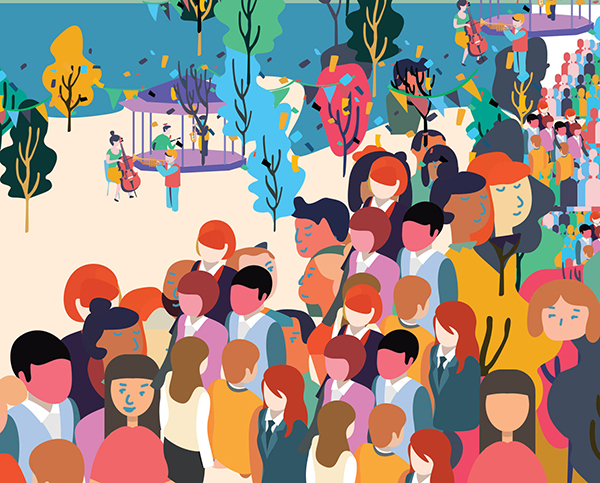Illustration by Marika Mirren
The Everyday Activist
essay by Derek Dorsey
I work in the music industry. I’ve booked thousands of shows and promoted scores of festivals—and have spent an untold number of late nights watching everything from folk to hip-hop. Outside my home in Kensington, the sound of children playing down the street has been an alarm clock of sorts, alerting me that it’s time to get my day going.
I live about 300 yards from Al-Aqsa Islamic Society, where, two years ago, a pig’s head was thrown at the building where those kids play and my neighbors pray. As I watched the news polarize the community after this particularly deplorable hate crime, I decided that I had to do something. Instead of watching the news, I wanted to change the narrative.
I walked over to the mosque, thinking that I might be able to speak with the cleric. There, a Fox 29 reporter from New York asked me what I was doing, and, after chatting with him for a bit, he asked if I’d like to be interviewed as a community activist. I didn’t realize that’s what I was, but I agreed. Eventually I was called in to speak with the mosque’s leader, a wonderfully spiritual man whose community held him in the highest regard.
He treated his position with great humility and responsibility, and he listened as I explained how sincerely I believe that we are all one community, and that we should stand together. After many meetings with the neighborhood’s community groups, we held a “Picnic of Solidarity.” It remains in my memory a proud moment, watching so many people of diverse backgrounds and faiths come together.
A strange news correction was printed soon after the event. “Derek Dorsey is not a Muslim,” it read. I hadn’t thought before about the significance of that, and I pondered my identity as an organizer of the event. I am a Philadelphian. I am a man. I am black. But I am not a Muslim. Before that correction, I had simply thought of myself as a neighbor.
More recently, as I rode back from a planning meeting for International Women’s Day (riding my bike, alone with my thoughts, is normally where ideas for event planning occur), I thought about being the only man in the room planning an event for women, organized by women. I was prepared this time for people questioning why I was there.
I realized I was doing it because it’s another opportunity to say to the world that, as a community, nation and world, we stand together as one. It’s imperative to draw attention to the inequality that women face every day. At the March 8 concert, I wanted to amplify the voices of many women I’ve worked with before who are loud, artistic and brilliant—who are equal.
This year, as I plan the fifth annual Sundrop Music and Arts Festival—another community-centered event—it will feature a big change: It will be a fundraiser for brain cancer, to honor and support a musician I know who is a survivor. The shift in the event feels very natural.
Sixteen years ago, I made a life decision to leave social services and pursue a career in the music industry, but the social worker in me never left—when someone needs help, I do my best. Maybe, to some people, that makes me a community activist. To me, it just makes me your neighbor.
Derek Dorsey is a former social worker, a professional road bike racer, and a talent buyer and event promoter in Philadelphia.



